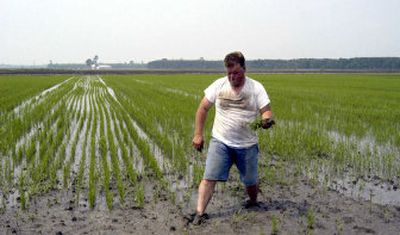Genetic rice raises concerns

SAN FRANCISCO – A tiny biosciences company is developing a promising drug to fight diarrhea, a scourge among babies in the developing world, but it has made powerful enemies because it grows the experimental drug in rice genetically engineered with a human gene.
Environmental groups, corporate food interests and thousands of farmers across the country have succeeded in chasing Ventria Bioscience’s rice farms out of two states. And critics continue to complain that Ventria is recklessly plowing ahead with a mostly untested technology that threatens the safety of conventional crops grown for food.
“We just want them to go away,” said Bob Papanos of the U.S. Rice Producers Association. “This little company could cause major problems.”
Ventria, with 16 employees, practices “biopharming,” the most contentious segment of agricultural biotechnology because its adherents essentially operate open-air drug factories by splicing human genes into crops to produce proteins that can be turned into medicines.
Ventria’s rice produces two human proteins found in mother’s milk, saliva and tears, which help people hydrate and lessen the severity and duration of diarrhea attacks.
But farmers, environmentalists and others fear that such medicinal crops will mix with conventional crops, making them unsafe to eat.
The company says the chance of its genetically engineered rice ending up in the food supply is remote because the company grinds the rice and extracts the protein before shipping. What’s more, rice is “self-pollinating,” and it’s virtually impossible for genetically engineered rice to accidentally cross breed with conventional crops.
“We use a contained system,” said Ventria Chief Executive Scott Deeter.
Regardless, U.S. rice farmers in particular fear that important overseas customers in lucrative, biotechnology-averse countries like Japan will shun U.S. crops if biopharming is allowed to proliferate. Exports account for 50 percent of the rice industry’s $1.18 billion in annual sales.
Japanese consumers, like those in Western Europe, are still alarmed by past mad cow disease outbreaks mishandled by their governments, making them deeply skeptical of any changes to their food supply, including genetically engineered crops.
Rice interests in California drove Ventria’s experimental work out of the state in 2004, after Japanese customers said they wouldn’t buy the rice if Ventria were allowed to set up shop.
Anheuser-Busch Inc. and Riceland Foods Inc., the world’s largest rice miller, were among the corporate interests that pressured the company to abandon plans to set up a commercial-scale farm in Missouri’s rice belt last year.
But Ventria was undeterred. The company, which has its headquarters in Sacramento, finally landed near Greenville, N.C. In March it received U.S. Department of Agriculture clearance to expand its operation there from 70 acres to 335 acres. Ventria is hoping to get regulatory clearance this year to market its diarrhea-fighting protein powder.
There has been little resistance from corporate and farming interests in eastern North Carolina, but the company’s work has raised the hackles of environmentalists there.
“The issue is the growing of pharmaceutical products in food crops grown outdoors,” said Hope Shand of the environmental nonprofit ETC Group in Carrboro, N.C. “The chance this will contaminate traditionally grown crops is great. This is a very risky business.”